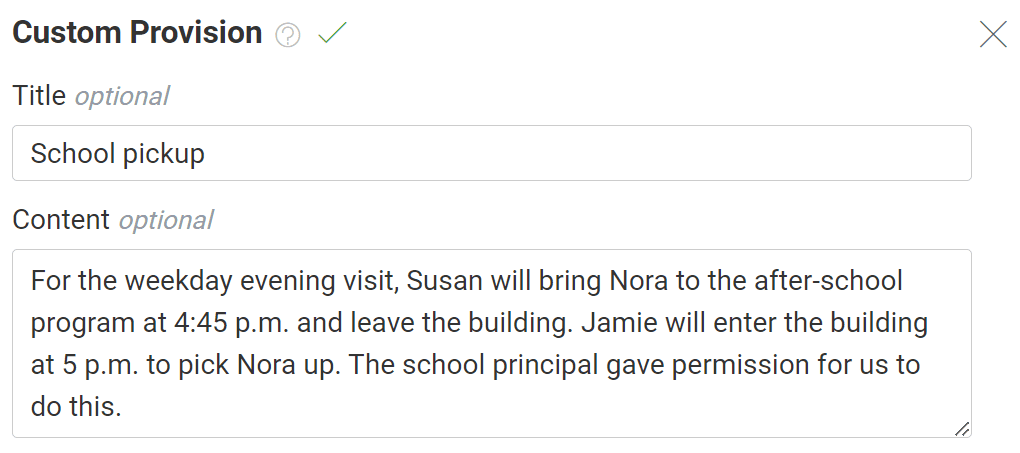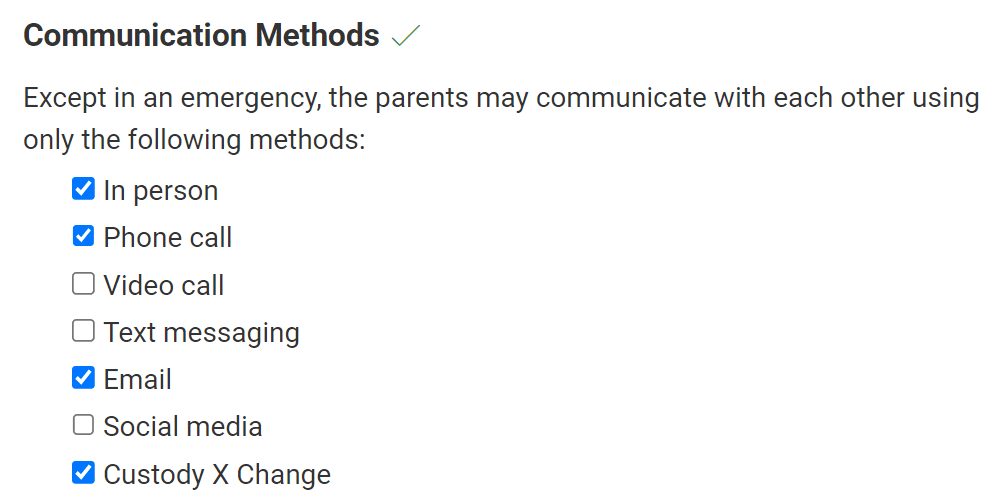What Co-Parents Should Not Do | What To Avoid as a Co-Parent
Your child's other parent is an important person in your child's life. You share responsibility for how you contribute to your co-parenting dynamics. Take a moment to consider what not to do when co-parenting, and make an effort to support your co-parent's relationship with your child.
Don't make promises you can't or won't keep
Especially if you've had an abusive or toxic relationship, or if your ex is playing dirty tricks to win custody, you may feel pressured to agree to whatever your ex suggests. But that will start off your co-parenting relationship on the wrong foot.
For example, your child's other parent may propose that you pick up your child from school every day. If you suspect this will be impractical for your work schedule, or if you anticipate other reasons why you won't follow through, it's important to say "no" up front, rather than try to slide out of the obligation later.
Not keeping your word makes you look like the parent who caused the problem, and it's unfair to your child.
If it's hard for you to stand up for yourself and your child when negotiating with your ex, seek professional legal help. A good mediator can help both of you listen to each other's requests and gain understanding of what's fair and realistic. A lawyer can buffer your interactions, and they'll represent your interests in court.

You can customize this to fit your situation with Custody X Change.
Don't neglect or avoid your parenting responsibilities
Once the court decides on a custody and parenting time arrangement, both of you have to follow the order. If that's difficult, try mediation or parenting coordination to clarify exactly what you'll both do going forward.
Ultimately, if one of you persists in defying the order, the other can ask the court to enforce it. They can also ask to have the order changed. For example, if you haven't been an active parent, they could ask for sole custody.
Don't be greedy about your parenting time either. Withholding time from the other parent is serious. If you disappear with your child, it might be considered parental kidnapping.
Many parents struggle with drugs or alcohol. If your substance use has started to affect how you parent or whether you can financially support your child, it's important to take steps to ensure your child's safety and well-being. That means keeping yourself healthy too.
Be a consistent, caring presence in your child's life, and support their visits with their other parent. Take care of yourself so you can fulfill your responsibilities.

You can customize this to fit your situation with Custody X Change.
Don't stop paying child support
Give your child support payments a high priority among your other financial responsibilities. You're expected to pay in full and on time. Your co-parent will appreciate the reliable financial help, and your child will benefit from it.
If you're having trouble affording child support, pay as much as you can, and be sure to talk to the support office. If you've lost your job, had major medical expenses or experienced other challenges, you may be able to have the support order lowered. Alternatively, the support office may put you on a payment plan so it's clear that you're trying to keep up.
If the state isn't involved in your child support payments, have a similar conversation with whomever is — the other parent or the family court.
Don't just quietly drop off the map. If you're not paying child support, not only will your child not receive any money, you'll also leave your co-parent with the unpleasant task of gathering evidence of your nonpayment and speaking to child support enforcement authorities. Your co-parent will appreciate it if you own up to the problem and take responsibility for fixing it.

You can customize this to fit your situation with Custody X Change.
Don't bother your co-parent
Some divorced or separated co-parents choose to spend time together as a family on a regular basis, at least for their child's sake. Many others, however, spend as little time together as possible and avoid all unnecessary conversations.
Little choices make a big difference. It's one thing to text a couple times about your child's day at school, and another to text a dozen times about your day at work. It's one thing to make a daytime call about what the pediatrician said, and another to call late at night about a movie you're watching.
Expressing affection for your ex may cause them to feel confused, embarrassed or even harassed. If both of you want to get back together, that's great. If not, give each other respectful distance so you can have privacy and move forward.
If you ask too frequently about your child, though you do so from a place of concern, your co-parent may receive your behavior as micromanaging or controlling.
Propose healthy boundaries, have the court turn these rules into a court order, and follow through. Even if you don't understand exactly why your co-parent wants relatively little contact, in the end you may simply have to honor their choice.

You can customize this to fit your situation with Custody X Change.
Don't take the focus off your child
Keep your child's needs at the center of your interactions. After all, being parents to the same child is the main reason you and your co-parent are in communication.
You may have a long or intense history with the other parent. Maybe one or both of you had affairs, or maybe you dislike each other's new partners. Maybe you're still arguing about who will get the house, the retirement account or the dog. Realistically, you may never see eye-to-eye or quite forgive each other about those issues.
But none of that is your child's fault. For your child's well-being, try to take a collaborative attitude to co-parenting.
For example, you might reach agreement that if one of you unexpectedly has to work late, you'll offer your parenting time to the other parent before you call a babysitter. This is a common arrangement. Some parents feel it best meets their child's needs and shows appreciation for each other's relationship with the child. It makes the decision less about whether you're in the mood to talk to the other parent, and it keeps the focus on how you both consistently support your child.

You can customize this to fit your situation with Custody X Change.
During and after your court case
Your court case is only the beginning of your new co-parenting relationship. A co-parenting app can be vital to making it work.
The Custody X Change online app has a thorough set of co-parenting tools: shared calendars, parent-to-parent messaging, expense tracking and more.

You can customize this to fit your situation with Custody X Change.
Turn to Custody X Change to ensure the best possible future for your child.
